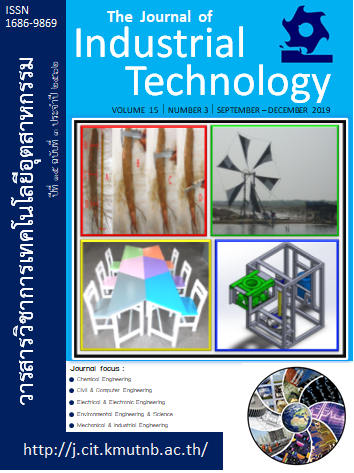(The Performance Improvement of Service Industry Supply Chain: A Case Study of Hotel in Sukhothai Province)
Keywords:
Value stream mapping, Supply chain management, ECRS technique, Why why analysisAbstract
Abstract
Hotel’s service industry has an important role toward economy and basic structures of transportation and tourism. Due to recent in competitive condition, hotel businesses must adapt and change in order to satisfy market’s needs by using internal resources of the organization to create usefulness and high efficiency. This study applied VSM technique to analyze and compare waste in Logistic management and hotel supply chain of two hotels as case studies in Sukhothai province, which were independent hotel and chain hotel along with applying Why Why Analysis and ECRS technique to improve efficiency by doing fieldwork to collect data, observing, and interviewing. The results after improving Hotels’ Logistics’ efficiency found that; case study 1 could reduce two NVA activities, which saved 7.15 minutes and was counted as 3.94% decrease, and one NNVA activity, which saved 5.10 minutes and was counted as 1.37% increase. This caused VA activity to increase for 1.37%; case study 2 could reduce two NVA activities and saved 5.20 minutes, which was counted as 0.31% decrease. This caused NNVA and VA activities to increase for 0.32% and 0.01% accordingly.
References
[1] Technology Promotion Association (Thailand-Japan), “Business Analysis- Hotels and Resorts 2010”, Available: http://www.sme.go.th/upload/ mod download, 3 June 2019. (in Thai)
[2] Government Savings Bank, “Economic cond- itions in 2018”, Available: https://www. gsb.or.th /getattachment/dae8495d-7374-48-5dde278/IN_ hotel_61_detail.aspx, 01 June 2019. (in Thai)
[3] Ministry of Tourism and Sport, “Surfing situation in 2019”, Available: https://www. mots.go.th/ more_news.php?cid=509&filename=index,01
April 2019. (in Thai)
[4] K. Thongin, “Supply Chain Management”, Available: https://kantanagarn.wordpress.com /20 13/07/13/supply-chain-management-%E0% B8% 81%E0%B8%B2%E0%, 05 April 2019. (in Thai)
[5] K.Desintham, “Developing a Stream of Value Charts Based on Lean Oncepts”, Available: http:// www.technologymedia.co.th/articledetail.asp?arid=2722&pid=258, 05 April 2019. (in Thai)
[6] S. Vinodh, “Application of Value Stream Mapping in an Indian Camshaft Manufacturing Organization”, Journal of Manufacturing Techn- ology Management 21(7), 2010, pp. 888-900.
[7] W. Wattanutchariya and T. Kuaites, “Value Stream Analysis of Riceberry Rice’s Supply Chain in Thailand”, Available: https:// ieeex- plore.ieee.org/document/8333935, 3 June 2019.
[8] P. Akkharaprathomphong, “Waste Reduction With ECRS Technique”, Available: https://cpico. wordpress.com/2009, 05 April 2019. (in Thai)
[9] S.Suwannarongsri and D.Puangdownreong, “Waste Reduction of Germinated Brown Rice Production Process”, Proceedings of IE Network 2012 Conference, Cha-Am Municipality Phetchaburi, Thailand, 2012, pp. 253-260.
[10] T. Kuaites, N. Chanthranapasawat and T. Thuean phae, “Service Industry Potential Enhancement for Improving Service Quality of Hotel: A Case Study in Sukhothai Province”, Research and Development Institute Ramkhamhaeng Univer- sity, Thailand, 2019
[11] P. Wattanarungsun and C. Sutunyarak, “Increas-ing Performance Efficiency of Employees In-4 Star Hotel in Siam Square”, VRU Research and Development Journal Humanities and Social Science, Vol 11, No 1, 2015, pp 71-80.
[12] S. Sittichai., S. Kun-oon., N. Hathaiwasiwong Suksri, “Dimensions of Service Quality in Hotels, Koh Samui, Surat Thani Province”, Phuket Rajabhat University Academic Journal, Vol 13, No 2, 2017, pp 183-203.
[13] P. Na Ayuthya and C. Pimonsompong., “The Development of Professional Standards for Hotel Employees in Thailand”, Journal of Southern Technology, Vol.10, No.2, July-December 2017, pp 1-8


